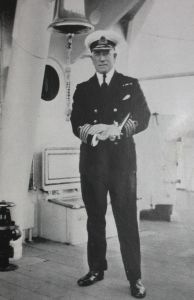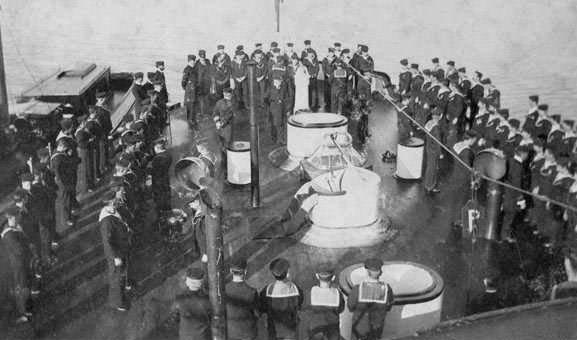| Henry James Feakes
1876 - 1950
First Lieutenant

"THE SAILOR'S AWAKENING"
Extract from White Ensign-Southern Cross published 1951.
A Story of the King's Ships of Australia's Navy.
By Rear-Admiral Henry James Feakes, C.B.E., R.A.N.
Note: The description below was witten one year after the second set of boilers on Cerberus had been condemned. Presumably, from the description below, the electric lighting and ventilation that had been installed in 1897, was no longer in use.
CONDITIONS ON BOARD The sailor is accustomed to greet the morn in strange places, but in my life no awakening was ever so strange as my first one in the Cerberus.
Arriving from England at Melbourne I had reported on board about 9.30 on a cold, wet and cheerless evening. Met at the gangway by a robust, elderly bluejacket carrying an oil lantern, I was escorted below through the dingy gloom of unoccupied mess decks and engine room to the officers' quarters lit with oil "police" lighting. A sleek, fat rat scuttled through the shadows. It was a bogey experience.
With murmured references to seeing the C.O. in the morning, I was ushered into what my escort informed me had always been the First Lieutenant's cabin. It was a dog-box, 6 feet by 6 feet. Passing a curtained cabin I had heard a bottle clink against the rim of a glass, the Officer-of-the-Watch entertaining himself for awhile. Lucky beggar! The gloom was calculated to drive anyone to drink.
Next morning I awoke, and lifting a weary head from the pillows, wondering where I was. Gazing around in the feeble light shed by a small, swinging oil lamp, I saw a wee figure placing tea and toast on a bracket screwed into the side of the narrow, coffin-like bunk in which I had lain through the night.
And then I remembered. It was the morn of my first day in the naval service of Australia. I was the newly-joined Sub-Lieutenant in the Cerberus, the old, 10-inch turret-gun monitor first commissioned in 1871, now flying the pennant of Captain F. W. Tickell, C.M.G., the Naval Commandant of the Victorian division of the lately-formed Commonwealth Naval Forces.
Not since an armoured belt had been clamped around her ample waist upwards of 40 years before had God's fresh air, or germ-destroying sunshine, penetrated into the vitals of the old ship. Forty years of potted air, and bilge! The smelly oil lamp did the rest.
Wishing to strike a friendly note with my new shipmate, and grateful for the new hold on life provided by the hot tea, I enquired, "How long have you been in the ship?" Carrying on steadily folding the mess of scattered clothing without lifting his eyes, the busy one replied, "Thirty-six years, sir". Thinking this an ill-timed jest I maintained a chilly silence for the rest of his visit.
Feeling somewhat disgruntled, I found myself wondering about my predecessors. My thoughts wandered back to the long-distant past, to the long list of those who had gone to the very borderland of self-asphyxiation, even as I had done, jammed into the little coffin in which I had spent the night.
I thought of the hero who made the passage out from England through the tropics, leaving a comfortable bed, perhaps in an old English country vicarage or farm, thence to the nightmare of a too-tightly-laced hammock on the sleeping deck of a training ship, or torpedo-flat in the lower regions of a man-o'-war. Possibly he had experience of awakening in a tea-house in Japan, or flower-boat in China, perhaps even from under a copy of the "Sydney Morning Herald" in the Domain. Yes, the sailor awakens in strange places, thought I.
My excursion into the past was checked by the entry of a big blonde-moustached man, obviously an ex-marine, with a can of hot water. I tried the old question, "How long have you been in the ship?" He replied, "Nineteen years, sir".
What's the catch, I wondered. What sort of an old man's home is this?
Again my thoughts wandered. I recalled a day in the Red Sea on the passage out. There had been a cheery group of young service people on board, young navy and Indian army officers en route to Bombay, also some bright ones amongst the ship's officers. All had a great curiosity regarding the young navy I was going half way round the world to join. My attractive version doubtless had wilted after a fortnight's close cross-examination, also after a study of the elderly colonial vessels masquerading as men-o'-war and shown in the Admiralty Navy List.
One clammy, steamy forenoon in the Red Sea the Quartermaster of the Watch, having made eight bells, had brought me a message requiring my attendance in the smoking-room. A group of bright young people sat stiffly round the table. I was informed by one sitting as their president that the sun was over the foreyard, and that they sat as a Medical Board of Survey assembled to inquire and report on my mental condition. My previous sea service, also conditions of service in the New Navy were considered. Some very bright bits of humour resulted, and finally the finding of the Court was announced. The Court's opinion was that I was stark staring mad, and I was ordered to provide a bottle of the juice of the juniper vine forthwith, and whenever further required by the Court.
This episode fairly illustrates the esteem in which Dominion naval services were not (repeat "not") regarded by other branches of His Majesty's Services at that time.
Lying in the little bunk in the Cerberus in this moment of great depression I wondered, "Were they right? Had I burned my boats for a will-o'-the-wisp?" I admit the thought passed through my mind that my career would be brief, as an early choleric captain of mine used to promise me in his moments of anger.
VICTORIAN GOVERNMENT POLICY
At Divisions I had an opportunity of getting a close-up view of my new ship-mates. Ancient Mariners, to a man!
 Sunday Divisions Sunday Divisions
photo courtesy of Australian War Memorial, negative number 300042
The severe axeing of personnel schemes in the years of naval depression had operated on the "last to join, first to go" principle.
Truly the survival of the fittest … … to hang on.
A hoary legend told of losses by fire of the "stud book" on two occasions in the captain's office. (The only other record of an inflammable nature, lost in volumes of smoke, was the Wardroom officers' wine account book awaiting examination by an Inspecting Officer on the second occasion.)
The personnel had, therefore, two opportunities each to reconsider his date of birth. If any doubt existed the person concerned gave himself full benefit. Legend only, of course.
I soon found I had a fine group of matured, experienced seamen as shipmates, to whom I look back to-day with unmixed feelings of regard and affection.
Little did we realize that exactly three years later the majority were to represent Australia worthily at Westminster on the ever-memorable occasion of the funeral of His Majesty King Edward VII. Still later they were to man the first units of Australia's Navy, as yet blueprints tucked away in pigeon-holes awaiting a turn in fortune's wheel before they saw the light. There were many other sound, solid elements remaining from earlier days upon which Creswell was rebuilding his personnel. The foundations of Navy had been well and truly laid by the mid-Victorians. Many old veterans among the warrant officers now serving had been broken in to the navy by the harsh but thorough methods of a generation forming definite links with Nelson and his times. Captain Alan Thomas and his staff had served Australia well in the foundation period.
More valuable still to the historian were the senior retired members of the Navy. I saw much at that time of the late Captain C. F. Panter, H.M. Victorian Navy, who commanded Cerberus on her passage from England in 1871. The story is an epic which should take a prominent place in Australia's early naval development. Her senior engineer officer for many years, Staff Engineer W. Breaks, Victorian Navy, was a frequent visitor to the mess, a great tale-spinner.
The long-debated naval expansion then in progress, and much in evidence at the Williamstown Naval Depot, was the intense interest to the superannuated, who had suffered only reduction for almost a generation. Many were the visits paid by the successful ones who were spending the evening of their days in the modest, retired comfort of Melbourne's seaside suburb of Williamstown. The traditionally garrulous, usually pessimistic, old gentlemen had many a tale to tell.
Of special interest to the newcomer experienced in modern naval organization was seeing in operation the retarding of development caused by the retention of all executive authority in the hands of civilian Treasury officials. The halting steps of those conducting naval development depended always on some political or Treasury motive, usually of a vote-catching nature. Strong in the political mind was the highly economic view that Defence was a part-time job for volunteers with sea-going ambitions. Economic comfort or conditions of service of naval officers were quite minor considerations.
The provision of an Officers' Mess ashore in the Naval Barracks, and transfer from the now almost pestilential Cerberus, was achieved by the representation of a need for a lecture room to provide educational facilities for naval militia officers. Only thus could a wardroom for the permanent naval officers be secured.
The erection of a modern switchboard to operate considerable expansion of lighting and other electrical equipment was obtained by requisitioning the necessary material "for militia personnel instruction", the annual "training" of a very capable engineer sub-lieutenant (now Electrical Commander F. C. Creswell, R.A.N., retired), being extended as required to supervise, indeed to complete the work.
In the ceaseless struggle for political power in the Federal Parliament, Mr. Alfred Deakin again became Prime Minister. The question of naval policy to be pursued by Australia was again resumed with Britain.
AUTHOR'S COMMENT: The personal element in this book is derived from actual contacts made by me with many actively concerned with naval development in Australia since its inception (1854), and particularly with the late Vice-Admiral Sir William Creswell.
Research and typing by Shirley Joy. |

